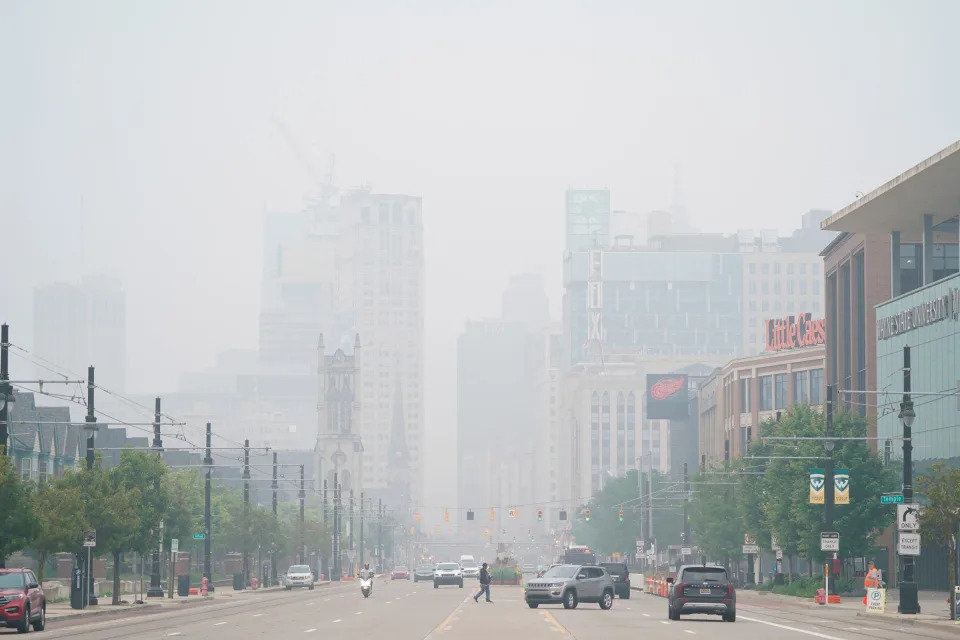Detroit Free Press – Opinion
We didn’t have a Pure Michigan summer. Pay attention to those climate warning signs.
Ali Abazeed – September 29, 2023
As summer draws to a close, it would be easy to forget the weather patterns and disruptions that took us about as far from a Pure Michigan summer as you can get. But we’re moving into an uncertain future, and we must pay attention to these warning signs.
Metro Detroit experienced unprecedented air quality alerts this summer, with over 23 days of air quality gauged unhealthy or worse, the first-ever air quality alert for the entire state, our own rash of fires due to unprecedented hot and dry conditions, and, thanks to Canadian wildfire smoke in early June, another air-quality alert first: a warning based on PM2.5, a form of fine particulate matter that wreaks havoc on the respiratory system.
Hospitals across the state reported increased admissions of patients suffering breathing problems due to poor air quality. For a region of the country that already ranks poorly in particle pollution, this summer’s alerts serve as a clarion call for action.
And it wasn’t just poor air quality. We’ve witnessed increases in extreme flooding, extreme heat, tornadoes and high winds, just this summer. If left unchecked, we are looking at scenarios that will lead to profound environmental degradation — and this for a state deemed a potential “climate haven” for its ability to weather the even more destructive effects of climate change.

Beyond the ‘hottest summer ever’: How climate extremes impact us
Flooding and erosion will likely disrupt Michigan’s precious freshwater systems, and could contribute to harmful algal blooms that damage aquatic life and pose a risk to human health. Just last week, the Michigan Department of Natural Resources added two new invasive species to the state’s watch list, likely the result of alterations in habitat conditions due to climate change. These environmental flags have far-reaching consequences for the region, our state’s social fabric, and public health.
The consequences of climate extremes extend beyond just the environment and health. The stress and uncertainty generated by extreme weather events also corrode our built environment and social square.
Upheaval due to extreme weather is leading to significant changes in the fabric of society. Research shows that climate change is causing “social tipping points”: fast and fundamental changes in human values, behaviors, the nature of relationships, technologies and institutions that are just as intractable and hard to undo as climate change itself.

Constant worry about the next flood or extreme weather event takes a toll on interpersonal relationships, and has a deleterious effect on community bonds. Neighborhood squares, once the bedrock of local culture and interaction, face an existential crisis as people are forced to move, houses are abandoned and the pressures of climate change reshape communities. The ironclad law of climate change is this: Underserved communities and communities closest to the pain will always bear the brunt of displacement, insecurity and devastation due to extreme weather.
More from Freep opinion: I lead the Michigan AFL-CIO. Trump has never shown up for union workers. | Opinion
This is to say nothing of the already growing political tensions likely to rise due to extreme weather.
Research has repeatedly shown that more extreme weather contributes to many adverse outcomes, including violent crime, political instability and even the collapse of global regimes. Locally, we have diverging views on accepting the science of climate change, let alone addressing its disastrous effects. Politicizing what should be a shared concern for our state will make it harder to enact meaningful change.
Climate change is a public health crisis – and a social challenge
So, what can we do?
First, we must accept that extreme weather is not just an environmental issue, but a public health crisis and a social challenge. A public health approach centers on the health and well-being of communities near and far, but also emphasizes the importance of our built environment and its effect on our health. If our built environment is constantly reconfigured and disrupted by the ensuing floods, droughts, storms, or wildfires, the consequences on our health will continue to be disastrous.
We must adopt and enforce policies that limit emissions and promote sustainable practices now.
It’s important to expand our conception of community, and invest in regional efforts vital to increasing the resilience of communities, like long overdue investments in regional transit.
Downstream communities like Dearborn cannot solve flooding alone — we need cooperation and support from upstream communities to improve resiliency.
Though climate change is often globalized, seen as a concept far removed from our day-to-day, local actions can provide significant outcomes in the short term. For example, research shows that though most climate-related actions save money and provide benefits in the long run, the benefits of emission reductions for improved air quality provide immediate results regarding improved health outcomes, agricultural benefits, medical expenses and economic benefits.
Actions at the local level matter, and there are essential steps you can take now in your own community: Encourage investment in green infrastructure that makes our terrain more resilient to inevitable extreme weather, shift toward renewable energy sources, and educate yourself and others on climate adaptation. Ask your local government whether it has a sustainability plan. When new developments are proposed in your community, make sure those developments move us closer to a green future. Political leaders should incorporate public health concepts and terminology into their climate policies to engage communities that are facing the brunt of the devastation.
The summer of 2023 was a glaring preview of what’s at stake for Michigan’s future. Our health, communities and shared social bonds are on the line.
The time for more decisive action was yesterday.
Ali Abazeed is a Dearborn native, founding director of public health for the City of Dearborn, where is is currently the city’s chief public health officer, and is a faculty member at Wayne State University.
